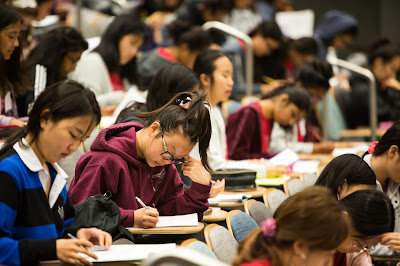 |
| The Math Prize for Girls, held annually at MIT, features 20 multistage problems in geometry, algebra, and trigonometry. Photo: Jake Belcher |
When Glenn Ellison coached his daughters’ all-girl math team all the way to the state finals, he noticed that his team was vastly outnumbered by boys.
Ellison, the Gregory K. Palm (1970) Professor of Economics at MIT, turned his dismay into research. With Ashley Swanson of the Wharton School at the University of Pennsylvania, Ellison published a paper that showed a huge gender gap in high school mathematics.
In the paper, “Dynamics of the Gender Gap in High Math Achievement,” distributed in August by the National Bureau of Economic Research, they reported that of the top 5,000 9th graders participating in the American Mathematics Competitions (AMC) from 1999 to 2007, just 30 percent were girls. By senior year, the number drops to 22 percent. High-achieving female math students were so discouraged they either dropped out of math contests, or saw their scores droop by their senior year.
The research confirmed and quantified what others had already come to know. Back in 2009, in an attempt to address this trend, Ravi Boppana ’86, a research affiliate with MIT’s Department of Mathematics, helped launch the Advantage Testing Foundation Math Prize for Girls. This past weekend marked the 10th anniversary of the contest, as a record 285 middle and high school female students from the United States and Canada arrived at MIT to compete for $60,000 in cash prizes...
Emma Kerwin, a senior management major, gave a talk on why girls should stay interested in math, even if, she said, they are “the only girl in the room.” The highlight of the event for her is the camaraderie. “They don't just have girls do the contest and then leave,” said Kerwin, who competed in the Math Prize competition during her junior and senior year of high school. “There is also a focus on having fun and being part of a supportive community. This provides a much more holistic experience for contestants.”
More importantly, she said, the competition gives contestants a chance to meet other girls who are interested in mathematics. “The overall nature of the event is very empowering and is focused on celebrating contestants' capabilities and unique interests.”
Read more...
Source: The MIT Tech










